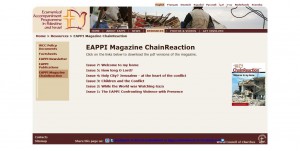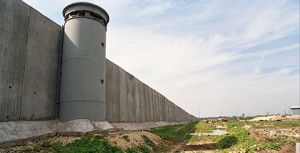Israel and the Palestinian Authority will be re-starting peace negotiations. This round, brought abouth by US Secretary of State John Kerry, does not seem to ignite a whole lot of optimism anywhere in our pressure-cooker part of the world.
We all want peace. I can’t imagine a singel person in the Middle East who will tell you that they don’t want peace. So, if that is the case, why don’t we have peace? We will, as soon as we all mean the same thing when we say “peace”. Saying, “I want peace” is easy, peacy. Making peace, it turns out, is a whole different ball-game .
A while ago I had visitors from overseas. They did a bit of touring, and part of what they wanted to see was the West Bank. They signed up with one of the bigger tour operators taking tourists from the non-controversial part of Israel to the West Bank. It’s not their real name, but for arguments sake I will call the operator Pity Tours. My friends found the tour very interesting and enlightening. They brought back the background brochure they were given. Having read the brochure, I think to myself, is it necessary to re-write history in order to present the Palestinian case? Small exampel: “The 1948 War. As the British started their pullout, fighting broke out. In the first part of the war, the Zionists, although fewer, had the clear advantage, bring better armed and much better organized”. (Green Olive Tours a Brief History of the Palestine-Israel Conflict). “Fighting broke out” is an aufemism for five regular armies, Syria, Transjordan, Lebanon, Egypt and Iraq’s coordinated attack on the one day old State of Israel. The brochure does not mention the fact that Israel was attacked by surrounding Arab armies in 1956, 1967 and 1973. It does not mention that more than 3000 civilian Israeli’s were killed within Israel in terrorist attacks. It mentiones the construction of the Security Wall, but not that the construction of the wall was proceeded by 118 individual terror attacks in Israel in 2001 and 135 dito in 2002, with a total of over 650 dead civilians. Neither does it mention that the number of dead civilians declined dramatically with “only” 67 victims in 2003, 45 in 2004 and 28 in 2005. That does not make the suffering of the Palestinians whose lives are restricted by the wall any less, but it puts the wall in a different perspective. Rather than saying “the wall is illegal, it needs to come down”, we could say, “For the wall to come down, terrorism has to stop”. In equaal meassure for the sake of the Palestinians.
Recently, I got in trouble over a blog I wrote, and in order to release the tension over that, I shall now write another blog on the same topic.
A classical Jewish way of explaining things is to draw parallels. So, I’ll start with one I just made up. Seeing things with only one eye doesn’t mean that you see half of what you would see with both eyes. In fact, you kind of see the same picture, but one-dimensional. Sometimes it doesn’t matter that you are only using one eye, but sometimes it can be outright dangerous, because using only one eye, you might misjudge the depths involved.
A few months ago my family hosted three women from Norway, two of whom were in Israel on a program called EAPPI, the Ecumenical Accompanying Program in Palestine and Israel. This is an international church-run program that sends volonteers to stay in the West Bank for three months, where the volonteers accompany Palestinians in order to protect them from settler violence and friction with the Israeli army.
We had a lovely evening with our Norwegian guests, who spoke only a little about the program they are on. Because I was not familiar with the program, I looked up the EAPPI after a few days and what I read on their web-site caused me real anguish. http://www.eappi.org/ I wrote a blog criticizing the EAPPI on my Swedish blog, and as it turns out, the blog was read by my Norwegian guests. I know they were upset by what I wrote and I feel ashamed that I’ve offended my guests by criticizing their program. Hospitality is very important to me and my family. On the other hand, I reacted very strongly, and said so in my blog, because I felt used by an organization that has what to my mind is a clear anti-Israeli agenda, and the fact that the accompaniers get to spend a few hours with a Jewish family allows the organization to say that they are not biased, and that the participants hear both sides of the story.
 One way of judging the conflict in the Middle East is to see who is more miserable. One of our guests writes in her concluding blog as an Accompanier that one side suffers more than the other. I absolutely agree with her on that. If our lives are a contest in misery, the Palestinians in the West Bank and Gaza win, hands down. While we wait for peace, we in Israel can live good lives. Much of that has to do with having a sound economy. Israel has the highest number of start-ups per capita in the world. We have low unemployment. We spend a lot on R&D, and that seems to pay off. Although the cost of living is high, the living is good.
One way of judging the conflict in the Middle East is to see who is more miserable. One of our guests writes in her concluding blog as an Accompanier that one side suffers more than the other. I absolutely agree with her on that. If our lives are a contest in misery, the Palestinians in the West Bank and Gaza win, hands down. While we wait for peace, we in Israel can live good lives. Much of that has to do with having a sound economy. Israel has the highest number of start-ups per capita in the world. We have low unemployment. We spend a lot on R&D, and that seems to pay off. Although the cost of living is high, the living is good.
In the West Bank and Gaza, economic initiative or entrepeneurship is not encouraged by the local authorities. Unemployment is very high, corruption is rife, freedom and access to information severly limited. Ideology speaks at least as loudly as pragmatism in Palestinian society. The Arab world as a whole suffers from low productivity and stunted economic growth, despite an abundance of natural resources. It may not be PC, but it’s a cultural thing. The decline of the economy in the Arab world is not caused by the Israeli occupation of the West Bank. The poor economy in the West Bank is to an extent caused by the occupation, but it is at least in equal measure a consequence of local politics, ideology and culture.
Now I have a point I’d like to make here that goes beyond public relations. The current situation is creating profound, daily misery amongst Palestinians in the West Bank and Gaza. Some of that is caused by Israeli occupation, to which I am opposed. But I believe the misery mostly has other causes. To mention two, one is the Palestinian choice of using terror as a tool of resistance. After almost 50 years of terror (the first PLO attack came in 1965, two years before the Occupation), Israelis are profoundly suspiscious of Palestinians. Every school, mall, bank, hospital has an armed guard at the entrance to prevent terrorist attacks. Jewish Israelis are afraid of Palestinians. We all know that the vast majority of Palestinians are peaceful citizens. But how do you know which one of the people standing in line behind you to the ATM is not? The other cause I believe is a trap is the decision by Palestinian leadership to keep consecutive generations of Palestinians in refugee camps and award them status as refugees, which entitles them to economic support by UNWRA.
There is constant friction between settlers and Palestinians on the West Bank, and the current situation is unfair and unsustainable. However, the common wisdom amongst Palestinians in the West Bank and in “pro-Palestinian” circles is that the occupation is the root of all evil. Palestinian violence towards Israelis, according to this school of thought, is legitimate, and because it’s OK, does not have consequences. The separation barrier according to that line of thought was not constructed to protect Israel against terrorism, but in order to steal Palestinian lands. And therefore there is no point in stopping the violence, because that is not what is causing Israel’s defensiveness. By the same strange thinking, check-points are set up and soldiers stand at the check-posts in order to harrass Palestinians, not because of fear of letting terrorists in to the country. That credo states that settler violence against Palestinians stands in no relationship to acts of terrorism by Palestinians towards settlers, such as the stabbing in Itamar two years ago of five sleeping members of the Fogel family, the youngest of whom was a three months old settler baby. And what I find to be the worst part of this one-eyed dogma is the thesis that says that what is good for Israel is by default bad for the Palestinians. If that is true, peace can only reach the region when one party destroys, anihilates, extinguishes the other party.
The EAPPI program is not helping; on the contrary it exacerbates an extremely complicated situation. Accompaniers join the program because they have already accepted that Palestinians are being consistently harrassed by settlers and soldiers for no reason.
 The barrier, or wall, that separates Israel from the West Bank, makes life difficult for tens of thousands of Palestinians. When Palestinians wish to enter Israel to work or receive medical care or visit their family, they have to stand in line, sometimes for hours, and they can be treated badly at the checkpoint.
The barrier, or wall, that separates Israel from the West Bank, makes life difficult for tens of thousands of Palestinians. When Palestinians wish to enter Israel to work or receive medical care or visit their family, they have to stand in line, sometimes for hours, and they can be treated badly at the checkpoint.
The part the left-eye afficionados like to skip is this. Construction of the barrier was started in 2002 after an unprecedented spate of Palestinian violence . The price is being paid by innocent Palestinians, whose everyday life is disrupted. But unlike the Jewish civilian victims of years of terror, they are alive and faced with choices. Part of the work of the EAPPI accompaniers is to follow their charges to the check-point. At the check-point civilians, mostly villagers, have to go through a security check manned by armed soldiers. Even if nothing happens, which is usually the case, seeing women and children confronted with armed men in uniform is difficult.
After years of Israeli military presence and loss of lives in southern Lebanon, a group of Israeli mothers in 1997 started a grassroot protest movement named “Four Mothers”, who’s activities eventually led to the Israeli army leaving southern Lebanon. One could imagine an alternative program by the EAPPI that would help create a parallel movement within Palestinian society to put an end to the use and glorification of violence by Palestinians. A local peace movment, that strove to end the use of terror as a legitimate means of Palestinian resistance, in exchange for removal of the barrier. The barrier, after all, is only a wall. If the massive Berlin Wall could come down after 50 years, this barrier could certainly disappear in a week, if it was deemed unnecessary.
Or if the EAPPI truly wanted to use both eyes, the accompaniers could divide their attention between the West Bank and Israel. I’m sure organizations for orphan victims of terrorism or the shell-shocked children of the southern city of Sderot would be happy to have some company.
But more realistic would be for the accompaniers to try to leave some tangible improvement behind them, within the school-system, informal education, sports, music and culture, nutrition and ecology. Build something, so that you have left a better place behind you, rather than leaving only the promise of more sympathy, forever imprisoning the Palestinians in their role as under-dog.
Although the accompaniers, some 120 people per year, spend an extended period in the West Bank, they get only a very limited and one-eyed view of the conflict. Their mission is then to go home and report on what they have seen. To generate sympathy. But not to challenge their hosts, ask why fourth generation Palestinians, unlike any other refugees on the globe, still live in refugee-camps. My  mother is a Holocaust survivor. I, however, am not a refugee and it is not my ambition that my children and grand-children should grow up in DP camps, somwhere in Europe, even if that might gain me points in the pity-game. So, a two-state solution is a solution, an integrated one-state solution, is a solution. Any solution is progress. Except allowing the creation of permanent misery. That is not a solution.
mother is a Holocaust survivor. I, however, am not a refugee and it is not my ambition that my children and grand-children should grow up in DP camps, somwhere in Europe, even if that might gain me points in the pity-game. So, a two-state solution is a solution, an integrated one-state solution, is a solution. Any solution is progress. Except allowing the creation of permanent misery. That is not a solution.
The battle slogan of the Brittish Colonists in the New World that led to the American Revolution was “No taxation without representation”. We now stand before new peace negotiations. It could be successful, but only if both sides take responsibility. The EAPPI brochure sports a cover-photo of a man wearing a sweat-shirt that says “I have rights” in English and Arabic. Yes, Palestinians have rights. So do Jews. And Jews and Arabs both have obligations. No negotiations without a sharing of responsibility.
Noomi Stahl


